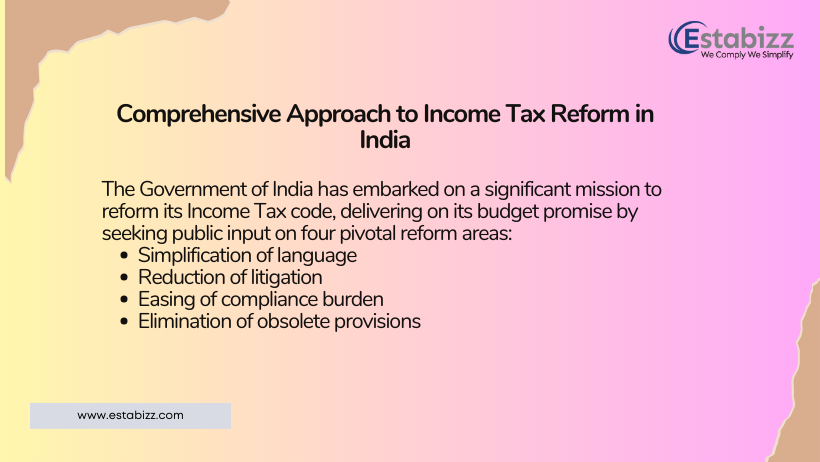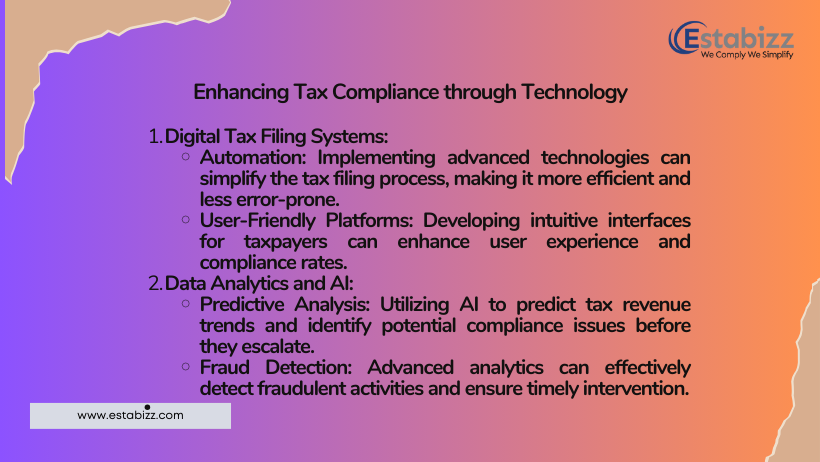Comprehensive Approach to Income Tax Reform in India
The Government of India has embarked on a significant mission to reform its Income Tax code, delivering on its budget promise by seeking public input on four pivotal reform areas:
- Simplification of language
- Reduction of litigation
- Easing of compliance burden
- Elimination of obsolete provisions

Simplifying Complex Tax Legislation
- Revamping archaic tax elements and using clearer language can significantly reduce confusion.
- Simplified compliance means fewer complexities for taxpayers, minimizing disputes over tax liabilities.
- Providing tax officers with assurance against penalties, unless engaged in evident collusion with evaders, can curtail unnecessary litigation.
Aiming for Enhanced Tax Collections
Although not explicitly stated, a central objective of these reforms should be boosting tax revenues. Here’s why:
- Current Tax Revenue: India’s income tax collection was 3.5% of GDP last fiscal year, with an expected rise to 3.6% by 2024-25.
- Global Standards: In OECD nations, income tax, coupled with social security, constitutes nearly half of their 34% GDP tax mop-up. Personal income tax alone often represents over 8% of GDP.
- India’s Position: India’s consolidated tax revenue (Centre and States) is about half the OECD level. To achieve developed nation status, adequate tax revenue is essential for governance and future investment.
Efficiency Over Rate Hikes
- Efficient Tax Collection: Rather than increasing tax rates, India should focus on efficient tax collection.
- Analyzing economic activity data can play a crucial role in this aspect.
Addressing Current Challenges
However, current government measures, like the mandated tax collection at source on international credit card transactions, seem cumbersome.
- These transactions create audit trails, so data verification can proceed without hampering the payment ecosystem.
- Examining discrepancies through income declarations of high foreign exchange spenders is vital.
Leveraging GST Data
- GST data analysis can detect income tax evasion.
- Breakdown Analysis: Value added by a company comprises gross profits and wages, both taxable under GST.
- With correct calculations, businesses can verify if GST payments align with declared profits and payroll.
The Case for Taxing Agricultural Income
- Taxing agricultural income can further enhance collections.
- The exemption myth: Not all farm income is exempt; states hold the power to tax it.
- Given the historical precedence of land revenue, as during the British Empire, states should be encouraged to exploit this revenue source.
- High-spending individuals claiming purely agricultural income should be subject to state tax scrutiny.
Additional Insights on Income Tax Reform and Global Perspectives
Continuing from our detailed exploration of income tax reform in India, it is pertinent to delve into additional aspects and their implications. Estabizz Fintech Private Limited is dedicated to offering a global perspective, ensuring that businesses can effectively navigate financial compliance challenges and leverage opportunities for growth.
Enhancing Tax Compliance through Technology

- Digital Tax Filing Systems:
- Automation: Implementing advanced technologies can simplify the tax filing process, making it more efficient and less error-prone.
- User-Friendly Platforms: Developing intuitive interfaces for taxpayers can enhance user experience and compliance rates.
- Data Analytics and AI:
- Predictive Analysis: Utilizing AI to predict tax revenue trends and identify potential compliance issues before they escalate.
- Fraud Detection: Advanced analytics can effectively detect fraudulent activities and ensure timely intervention.
Global Trends in Tax Administration
Understanding global best practices can provide valuable insights for India’s tax reforms:
- Digital Transformation in Tax Authorities:
- Countries such as Estonia and Australia have successfully integrated digital solutions into their tax systems, resulting in higher compliance and reduced administrative costs.
- International Collaboration:
- Enhanced international cooperation among tax authorities can help track cross-border transactions and ensure compliance with global tax norms.
- This is particularly relevant for businesses operating internationally, as it simplifies the process of adhering to multiple tax jurisdictions.
Incentivizing Honest Tax Practices
Creating an ecosystem that rewards compliance and honesty can drastically improve tax collections:
- Incentives for Early Filers:
- Offering tax rebates or faster refund processing for early filers can encourage timely compliance.
- Transparent Communication:
- Establishing clear communication channels between tax authorities and taxpayers can help address concerns promptly, fostering trust and cooperation.
Addressing Sector-Specific Taxation Challenges
Each industry faces unique challenges in terms of taxation. Understanding and addressing these can improve compliance:
- E-commerce and Digital Services:
- Implementing standardized tax regulations for e-commerce and digital service providers to ensure fair and consistent taxation.
- Startups and SMEs:
- Offering simplified tax processes and support for startups and SMEs to alleviate their compliance burden and promote entrepreneurial growth.
Towards a Robust Tax Infrastructure
Reforming tax laws is a continuous process that demands adaptability and foresight:
- Continuous Review and Feedback:
- Regularly reviewing tax regulations and seeking feedback from stakeholders can help keep the system relevant and efficient.
- Capacity Building:
- Investing in training and development for tax officials ensures that they are equipped to handle the complexities of modern tax administration.
Conclusion: Toward a Modern Tax Administration
While reforming India’s tax law is crucial, it’s equally important to revamp the tax administration framework. By adopting these holistic measures, India can match global standards, thus empowering its economy for sustainable growth and governance capabilities.
Key Takeaways
- Embracing Technology: Leveraging technology can streamline compliance and enhance efficiency.
- Global Best Practices: Drawing from successful international examples can strengthen India’s tax administration.
- Incentivizing Compliance: Creating rewards for compliance can foster a culture of honesty and cooperation.
- Sector-Specific Solutions: Tailoring tax regulations to meet industry-specific needs can improve overall compliance.
- Clear and Concise Laws: Simplification aids taxpayer understanding and reduces compliance burdens.
- Boosting Revenue without Rate Hikes: Efficiency in collection, not higher rates, is key.
- Smart Data Use: Harnessing data analytics to track and verify tax liabilities.
- Incentivizing State Participation: Recognizing states’ roles in agricultural taxation to bolster revenues.
Estabizz Fintech compiled the material in this article using the most recent Acts, Rules, Circulars, Notifications, Provisions, Press Releases, and material applicable at the time. They ensured the completeness and correctness of the material through due diligence. When using this material, users must consult the relevant, applicable legislation. The given data may change without prior notice and does not constitute professional advice. Estabizz Fintech disclaims all liability for any results from the use of this material.




